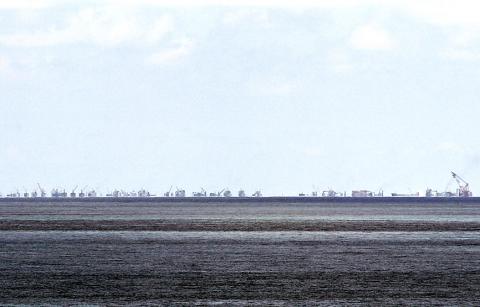The Pentagon on Tuesday said that a recent Chinese missile launch in the disputed South China Sea was “disturbing” and contrary to Chinese pledges that it would not militarize the disputed waterway.
The South China Sea is one of a growing number of flashpoints in the US-China relationship, which include a trade dispute, US sanctions and Taiwan.
China and the US have repeatedly traded barbs in the past over what Washington says is Beijing’s militarization of the South China Sea by building military installations on artificial islands and reefs.

Photo: Reuters
A US official, speaking on the condition of anonymity, said that the People’s Republic of China (PRC) tested multiple anti-ship ballistic missiles over the weekend.
“Of course the Pentagon was aware of the Chinese missile launch from the man-made structures in the South China Sea near the Spratly Islands [Nansha Islands, 南沙群島],” Pentagon spokesman Lieutenant Colonel Dave Eastburn said.
“I’m not going to speak on behalf of all the sovereign nations in the region, but I’m sure they agree that the PRC’s behavior is contrary to its claim to want to bring peace to the region and obviously actions like this are coercive acts meant to intimidate other [South China Sea] claimants,” Eastburn added.
China has not confirmed the missile tests and on Tuesday the Chinese Ministry of Foreign Affairs declined to comment, referring questions to the Chinese Ministry of National Defense, which did not respond to a request for comment.
The Chinese government has said that the military was carrying out drills between the Spratly and Paracel Islands (Xisha Islands, 西沙群島) starting last weekend and ending yesterday, warning other shipping not to enter a designated area.
China’s claims in the South China Sea, through which about US$5 trillion in ship-borne trade passes each year, are contested by Taiwan, Brunei, Malaysia, the Philippines and Vietnam.
News of China’s missile test was first reported by NBC News.

AGING: As of last month, people aged 65 or older accounted for 20.06 percent of the total population and the number of couples who got married fell by 18,685 from 2024 Taiwan has surpassed South Korea as the country least willing to have children, with an annual crude birthrate of 4.62 per 1,000 people, Ministry of the Interior data showed yesterday. The nation was previously ranked the second-lowest country in terms of total fertility rate, or the average number of children a woman has in her lifetime. However, South Korea’s fertility rate began to recover from 2023, with total fertility rate rising from 0.72 and estimated to reach 0.82 to 0.85 by last year, and the crude birthrate projected at 6.7 per 1,000 people. Japan’s crude birthrate was projected to fall below six,

US President Donald Trump in an interview with the New York Times published on Thursday said that “it’s up to” Chinese President Xi Jinping (習近平) what China does on Taiwan, but that he would be “very unhappy” with a change in the “status quo.” “He [Xi] considers it to be a part of China, and that’s up to him what he’s going to be doing, but I’ve expressed to him that I would be very unhappy if he did that, and I don’t think he’ll do that. I hope he doesn’t do that,” Trump said. Trump made the comments in the context

SELF-DEFENSE: Tokyo has accelerated its spending goal and its defense minister said the nation needs to discuss whether it should develop nuclear-powered submarines China is ramping up objections to what it sees as Japan’s desire to acquire nuclear weapons, despite Tokyo’s longstanding renunciation of such arms, deepening another fissure in the two neighbors’ increasingly tense ties. In what appears to be a concerted effort, China’s foreign and defense ministries issued statements on Thursday condemning alleged remilitarism efforts by Tokyo. The remarks came as two of the country’s top think tanks jointly issued a 29-page report framing actions by “right-wing forces” in Japan as posing a “serious threat” to world peace. While that report did not define “right-wing forces,” the Chinese Ministry of Foreign Affairs was

PREPAREDNESS: Given the difficulty of importing ammunition during wartime, the Ministry of National Defense said it would prioritize ‘coproduction’ partnerships A newly formed unit of the Marine Corps tasked with land-based security operations has recently replaced its aging, domestically produced rifles with more advanced, US-made M4A1 rifles, a source said yesterday. The unnamed source familiar with the matter said the First Security Battalion of the Marine Corps’ Air Defense and Base Guard Group has replaced its older T65K2 rifles, which have been in service since the late 1980s, with the newly received M4A1s. The source did not say exactly when the upgrade took place or how many M4A1s were issued to the battalion. The confirmation came after Chinese-language media reported